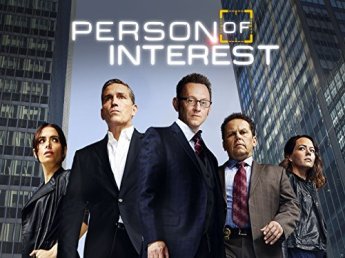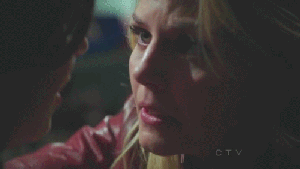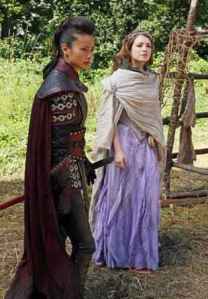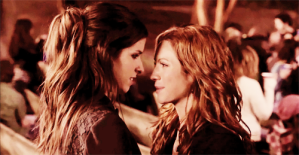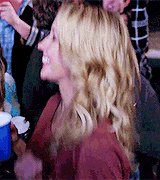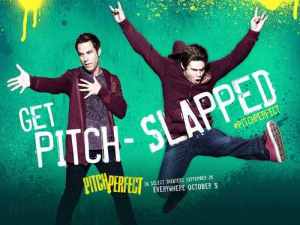
The 1920s saw the birth of the “New Woman,” (Miller, 1992) a sophisticated breed, independent of men and free to explore love in all its facets. 60 years later, Donna Deitch took a novel that was already twenty years old and created a “new lesbian” for the American movie, a breed that claimed its happy ending against all odds. This “new lesbian,” however, did not replace existing lesbian stereotypes; it merely gave female homosexuals a mirror image they did not have to fear.
Until the 1980s lesbian representation in American movies was closely linked to the theories of scientists and psychoanalysts like Havelock Ellis and Sigmund Freud. While “congenital inversion” was seen as a hereditary disease and the invert therefore a victim, it still insisted on homosexuals being doomed to a life in misery. And lesbians – however few there were – in American movies before the 1980s were also doomed, often not even to live. (Rule, 1976)
In 1961 The Children’s Hour, a movie version of Lillian Hellman’s controversial play of the same title, was remade. The play, as the 1960s movie, is about two female school teachers who are accused of being lovers by one of their students. Though the girl who made the accusations is protected by her innocence the movie shows the cruelty of an adult society towards people who are (supposedly) different and results in the death of one of the teachers – because she realizes that the accusations may be right in her case. The lesbian dies, and a stereotype is born: the suicidal lesbian that is hopelessly in love with her best heterosexual friend, or teacher, or fill-in-the-blank. This lesbian stereotype is not exclusively linked to movies since it originated in literature but movies are the media that holds it up to this day. One has only to watch Lost and Delirious (2001) to be confirmed that lesbianism and suicide are still closely linked together.
Desert Hearts is based on a novel that was published just three years after The Children’s Hour was shown in American movie theaters. The novel, Desert of the Heart by Jane Rule, tried to eliminate some of the myths that were engraved in the American mind where lesbianism was concerned. Rule created female characters that discovered their homosexuality and embraced it. Lesbians finally achieved a happy ending – in literature.
But it took twenty years for the novel to reach the big screen; having finally reached it, however, it showed the same effect on movie-making as the novel had in its respective media: it established a positive image of female homosexuality.

In Comparison
Despite the similar accomplishments of novel and movie their differences are significant. Without even having read the book or having watched the movie one difference immediately catches the eye: the titles. Desert of the Heart. Desert Hearts. While the first one seems to poetically describe Reno, Nevada, as the place where marriage finds its final resting place in a divorce, the second sounds like a reno-vated version of “the Lonely Hearts Club.” And the titles also predict the endings of both: where Reno is romanticized the two protagonists stay, where it is trivialized the female lovers leave.
Though the movie claims to be based on the novel it pretty much changes all essentials, even down to the names of the leading characters: Ann Childs becomes Cay Rivvers, Evelyn Hall becomes Vivian Bell. But there is a reason for this as the novel uses several biblical images that the movie erases. The names are a not very subtle hint toward Adam and Eve with Evelyn saying at one point to Ann: “You could almost imagine there were no other people.” The desert surrounding Reno leaves the English teacher in “catholic desolation,” although she is of protestant upbringing. Christian symbolism is a cross Deitch does not care to bear on her shoulders and she eliminates it together with the criticism of Freudian theory which Jane Rule has once called “a religion to parallel, without needing to replace, Christianity.” Evelyn’s interdependent marriage to George had provided this criticism but in the movie Vivian says of the reason why her marriage to Martin failed: “[It] drowned in still waters.” There is nothing left of the dominant figure that terrorizes his wife because he cannot compete with her professionally. Vivian has to find her own way our of a marriage that left her unfulfilled without her knowing why, while Evelyn is more or less forced to end her marriage. “The new lesbian,” therefore, has to find her way out of dependencies on her own; she has to choose to free herself of male dominance. For very much the same reason, Deitch explains Cay’s father’s death with a heart attack, not as a suicide. Ann’s struggle with the way her father died is the reason for many of her decisions – or indecisions – but it ties her to a dominant male figure, a provider. In the movie Frances is the only one obsessed with the absent Glen, and it makes her cling to Cay who is a female version of her father. Deitch inserts a slightly incestuous theme through Frances’ lingering love for Glen through Cay and puts Frances’ intolerance towards homosexuality in a hypocritical light showing her own homoerotic feelings toward Cay. In the novel, Frances does not even disapprove of the relationship between Ann and Evelyn; she only wants her step-daughter to be happy.
These differences are the most striking but not all of them are listed. Only the basic frame of the story is left intact: A woman comes to Reno to get a divorce and falls in love with a younger woman. They stay together. Apart from that the movie interprets the novel freely and becomes a piece of modern interpretation of homosexuality because of the changes made. Desert Hearts would not have become a lesbian classic had it clung to Jane Rule’s original ideas; it needed to become a movie about “the new lesbian” for “the new lesbian.” And this is why, though the plot takes place during the 1950s, Desert Hearts is very much rooted in the 1980s.
Let us have a closer look at this “new lesbian” the movie provides us with: 
Introducing Cay Rivvers
On their way to the ranch, where Vivian Bell (Helen Shaver) will spend her six weeks of residency that are required to get a divorce in Reno, Frances’ and Vivian’s conversation is interrupted by the introduction of Cay Rivvers (Patricia Charbonneau), Frances’ “daughter.” The scene is induced by Frances Parker (Audra Lindley) exclaiming: “Oh, brother,” then we hear a car go by, before the scene is cut from Vivian’s turning head to Cay’s – giving it the indication that they turn towards each other – as she puts her own car into reverse with screaming wheels and in the following cut pulls up next to Frances’ car driving backwards. Vivian and Cay are introduced by Frances, a bizarre setting for a first meeting but taken in strife by Frances who is quite used to her step-daughter’s exuberant nature. Cay makes a quip about having to call Vivian “professor” but has to put her car back into drive due to an oncoming car.
As soon as Cay pulls up to Frances’ car we hear Buddy Holly singing “Rave On” as if out of Cay’s radio. Her car itself is a black convertible that misses its backseat, as we are to learn later on. Everything about Cay is young and daring and modern. Most of her clothes leave the viewer wondering if the actress left her own clothes on when she entered the 1950s movie set, this especially applies to a set of cut-off jeans. With all these indications it really is no surprise when the audience learns that Cay is not only a lesbian but an out lesbian. Her self-assured attitude toward her sexuality frustrates Vivian later in the movie when she herself is struggling to be out in Cay’s presence. She exclaims: “No fear, no confusions, so self-assured…” Only to be interrupted by Cay shouting: “I don’t act that way to change the world. I act that way so the goddamned world won’t change me.” It is their only real argument, their conflicting views stem out of their different experiments with homosexuality and the fact that though Vivian is older she does not have Cay’s sexual experience. And she never had to fight with the kind of social marginalization Cay hints at in this scene.
It is also another car-scene. There are quite a number of scenes that take place in a car – not the least of them the first kiss of the two leads –, the one between Vivian and Frances being the first. It puts the people in the car into a frame, one could also say a cage, as the audience’s perspective becomes a voyeuristic one. In the scene with Frances the close confines make Vivian, who is a private person, uncomfortable. She is forced into an intimate setting and a conversation with a stranger. Frances’ easy-going nature is a direct contrast to Vivian’s awkwardness; the two women could not be more different. The car represents Vivian’s situation: she is trapped in a strange place she does not want to be in. Her only shield from the outside world – and the blazing sun – are her sunglasses. She puts them on just before she meets Cay. However, both women take their sunglasses off as they are introduced.
The glimpse we get of Cay is the same Vivian gets: it is quick, it is loud and it is wild. In the commentary to the movie, director Deitch tells us that there had been a couple of actresses who wanted to play Cay just to be in that scene, doing what Cay is doing. It is a daring introduction, but it is also a superfluous one. We are yet to learn that Cay’s “wild streak” is an act she puts on, often to impress women. But this is not the person Vivian falls in love with; Vivian falls in love with a young woman who is sensitive and thoughtful and does not dare to step out of the confines of her surroundings. She also falls in love with her friend, because that is what Cay becomes to her after she sheds the aggressive act.
Female relationships
As I have already written, Deitch focuses her attention much more on the female relationships than Rule did by eliminating dominant male figures. Walter (Alex McArthur) is pretty much the only man who is tolerated in the midst of strong female characters. The combinations of the female encounters are an interesting mix of friendship, comradeship born out of necessity, but also antagonism. Lucille (Katie Labourdette), another divorcee in Frances’ care and painfully reminiscent of Lucille Ball, verbally attacks Vivian early on but cannot compete with the quick intelligence of her opponent. However, as time on the ranch passes slowly, Vivian finds herself in Lucille’s company yet again when the two are out riding with Cay and Buck (Tyler Tyhurst), the ranch hand. Lucille relates to Vivian that she had been in a mental institution because she could not cope with the guilt she felt over the failure of her marriage but that Buck is helping her getting back on her feet. Vivian agrees, saying that Cay’s friendship is helping her also. This revelation compels the redhead to warn Vivian about getting too close to Frances’ daughter as she was “kicked out of college for unnatural acts, as they say.” The English professor is not to be deterred, however, and Lucille makes it clear that she does not approve of homosexuals, which only earns her another witty remark by Vivian that she is not above criticism just because she is straight.
As with many of the one-on-ones between the characters the pace of this scene is deliberately slow. The characters talk, relating not only their opinions but also their inner selves. Vivian is not shocked by Lucille’s revelation of Cay’s sexuality as Cay has been far too open about it, already, even if not in words. At some point in the novel, Vivian’s stance toward homosexuality is described: “If she had never actually made love to another woman, she was intellectually emancipated in all perversions of flesh, mind, and spirit. Her academic training had seen to that.” I do not necessarily approve of the choice of words here but the short passage accurately pinpoints what some writers of lesbian fiction try to ignore: you do not have to have slept with a woman to intellectually know how to do it. In the movie, Vivian’s knowledge is expressed in boredom with Lucille’s intolerance. In her line of work, Vivian has probably encountered quite a few lesbians – among faculty as well as students – and she cannot even pretend to be shocked anymore. But her knowledge is theoretical and does not prepare her for the force of her own or Cay’s feelings as they are later discovered and explored.
The desert acts as the local setting of the conversation but the backdrop is a metaphorical one. Lucille is eager to share with Vivian the nature of her relationship with Buck. She says: “Amazing what a little understanding will do.” All that is missing at this point are her fingers making quotation marks as she is clearly not talking about “understanding” at all. Vivian does not take the bait, though. Her reluctance to talk about any intimate details of Lucille and Buck’s relationship is clear and she steers the conversation to seemingly safer grounds mentioning her own friendship with Cay. But this leads Lucille to talk about Cay’s sexuality instead. We have a recurring theme in this sequence: Homosexuality before a heterosexual background. The whole movie seems to work on this premise as the setting is Reno, which is known for three things: marriage, divorce and gambling. Though gambling may not necessarily be a heterosexual institution, marriage and divorce are. In detail these scenes emphasize the aforementioned theme: Frances and Vivian watching a romantic movie and talking about Cay, Cay and Silver (Andra Akers) in the bathtub with Joe (Antony Ponzini) preparing dinner in the kitchen, and, of course, Vivian and Cay leaving the courtroom after Vivian’s divorce is finalized. But what is accomplished with these scenes? Are they an indication that “the new lesbian” has to stick out, or come out, against heterosexual conventions? Or are they merely underlining what is obvious: the majority of people is heterosexual and will always be the background before which lesbians and gays have to live their life? And does that have to inevitably mean having to put up with intolerance from people who are not educated enough to see that love is love whether it is between a man and a woman or members of the same sex?
The Party’s Over
After an evening spent at Silver’s and Joe’s engagement party, with heterosexual love but also convention surrounding them and not even the possibility to dance with each other, Cay and Vivian are yet again in deep conversation in the private confines of Cay’s car. Both are a little drunk but unwilling to end the evening and because they are a little drunk the conversation between them takes on a flirtatious note. They drive out to the lake where they continue their conversation and Cay finally confronts Vivian first with her supposition that the professor is attracted to her, later with a kiss.
The focus of attention at this point is not on Cay’s frank intentions toward Vivian; it is on Vivian’s inability to rein in her own feelings. She struggles with her reasons for divorcing Martin, her feelings for Cay, and the chaos that is raised in the aftermath. Helen Shaver gives the audience a first glimpse at her character’s vulnerability, but also of the passion that lies underneath the surface. The fight within Vivian is an old one of conventions one was brought up to and the pursuit of what will make one happy. If these two clash, and they usually do when one discovers one’s homosexuality, one has to chose. For the drive in the car Vivian lets her inebriated state take the blame but this does not work when Cay finally kisses her. And she kisses her back. Vivian is coming out and this is a process that director and actress show in a teasingly slow development. But it is believable, because one does not cope with one’s own homosexuality over night.
Although not the center of attention, Cay’s life alters as well. She relates to her best friend Silver that she may have “found somebody who counts,” a phrase she had also used earlier with Frances. While her behavior – and Frances words – attests to the fact that she is sexually active with a number of women, though we are only introduced to Gwen, her words assure the audience that she is looking for love, a convention that was hitherto a privilege granted only to heterosexuals in movies.
Love as a privilege of heterosexuals. This may seem odd to viewers of today’s generation, a generation that has seen two cowboys fall in love on Brokeback Mountain and women sharing their lives on The L-Word. But up to Desert Hearts homosexuality in the movies was reduced to sexual acts, often linked to violence and social outcasts. Lesbians in the movies before 1985 were prison guards, criminals, or other manipulative women in a power position to another woman who was than exploited by the lesbian character. These lesbians often had to use force to get what they wanted: sex. Love was not part of the equation.
It is, however, in Desert Hearts. And it is even put in the context of the heterosexual stereotype of “the one.” It is not any woman Cay falls in love with, it is Vivian, and she tells her new lover frankly that she has never been in love before. And one could at least assume that the same holds true for Vivian also. Has she been in love with Martin, or did she merely bow to conventions in marrying him? The novel says she did. But even if she had been in love with her husband once this feeling is long gone. And as the desert can be seen as a metaphor for her life with Martin, the lake, Cay leads her to, signifies the end of it; the end of her marriage, the end of her life without love, the end of the cruel dryness of the desert. The rain acts as the surprising effect of recognition and leaves her drenched and kissing Cay. And as much as this moment signifies the end of order for Vivian, which she is afraid of, it is also a beginning she does not recognize as good at first – though she does not see it as a total disaster either.

Lovers and Critics
In 1986 Vincent Canby wrote about Desert Hearts in “The New York Times”: “The film is the first fiction feature to be directed by Donna Deitch, whose previous experience in documentaries and commercials appears to have left her with a terribly literal idea of what movies should be. ‘Desert Hearts’ has no voice or style of its own. It’s as flat as a recorded message from the telephone company.”
In 2003 Sarah Warn, then chief editor of Afterellen.com1 wrote about the movie: “But overall, Desert Hearts is just as interesting and compelling as it was almost twenty years earlier when it won a Grand Jury Prize at Sundance in 1986, and serves as an example of the heights you can achieve without a big budget if you have strong actors, the right story, and a director who knows how to pull it all together.”
One of the differences between these two reviews is that the first one was written by a man and the second by a lesbian. Is that also the reason why the second is so clearly in favor of the movie and the first one is not? There is no question that Desert Hearts has its value in American movie history, but is this value limited to its accomplishments for the lesbian audience?
The focus of this paper lies on proving that Desert Hearts created a “new lesbian” (as I have called her). A female homosexual that was neither a sexual predator or a social outcast, a woman that, recognizing her difference, does not despair and commits suicide. It is the most important aspect of the film and probably the reason that it is still recognized today – even if predominantly by the lesbian community. But I would not have written a paper about if I had thought that it was a bad movie. The criticism in “The New York Times” is harsh. It reduces the movie to parts of the dialogue that even Sarah Warn admits is “clunky and corny.” The features that make Desert Hearts a compelling story, the acting and the groundbreaking love-scene, are dismissed or left out.
In his review for the “Chicago Sun-Times” Roger Ebert calls the movie: ”[a] spiky debut, with a tumultuous love scene, which is more than a nostalgia trip despite the redneck 50s setting.” And although he does not entirely praise the movie as many reviews by lesbians have done and still do he acknowledges the strong acting, especially of Helen Shaver, and the “undeniable power” that for him comes “from the chemistry between Shaver and Charbonneau.” His conclusive statement is the following: “The movie makes no large statement; it is not a philosophical exploration of lesbianism, just the story of two women and their attraction. It’s not a great movie, but it works on its own terms.”
I think, I can almost agree with that assessment as I can also agree that some of the lines are indeed “corny.” But does that answer my question of the significance of the movie for non-lesbian viewers? No, it does not.
The DVD cover quotes the “Sunday Times,” that stated that the love scene in Desert Hearts far exceeded the eroticism of the love scenes between Kim Basinger and Mickey Rourke in 9 ½ Weeks. This comparison is a strong one as I can still remember having read a lot about 9 ½ Weeks and its effect on representation of sexuality in movie encyclopedias. So is this Desert Hearts ultimate value for the heterosexual mainstream movie-goer? A love scene that has a greater appeal than the ones in 9 ½ Weeks? As sad and bizarre as it sounds, yes, that seems to be the case. In preparation for this paper I have read that the actresses who were signed up for playing lesbians on The L-Word, a television show that bows a lot to stereotypical representation of lesbianism despite the fact that it is done by lesbians, were required to watch the love scene between Helen Shaver and Patricia Charbonneau because of its authenticity as well as its erotic power. Sad and bizarre, indeed.
24 Years Later
“The new lesbian.” She is strong, independent, out, and proud. And she is also beautiful, which she has not always been, especially in the prison movies of the 60s and 70s. But where is this lesbian that was new in the 1980s now? She’s still there, and she has not changed much. The L-Word is yet again a perfect example of the representation of “the new lesbian,” but we can also look at some movies that would probably not have been done if it had not been for the groundbreaking Desert Hearts, or at least not in quite the same fashion:
In It’s in the Water a Texan socialite falls for a lesbian nurse of a hospice for AIDS-patients. The story is eerily familiar as the dark-haired nurse is a little tomboyish, and the blonde socialite struggles with her unfulfilling marriage. Luckily, director Kelli Herd adds a gay couple and a cast of Texan originals to the plot or it would probably have been called a rip-off of Desert Hearts.
Another set of the tomboy and the beauty is The Incredibly True Adventures of Two Girls in Love, where two teenage girls fall for each other, the tomboy being a daughter of lesbian upbringing, who has to work at a gas station after school. Young women are also in the focus of the plot of Better Than Chocolate. Luckily, in this comedy both women are already out and nobody has to struggle with the drama of recognition. But once again, we have a tomboy who struggles economically.
The bottom line of lesbians in movies seems to be: you have two beautiful women with one of them being a tomboy, but by no means a butch. The tomboy is the out lesbian, while the femme of the duo often struggles with her sexual identity but never financially. She is usually also the one with the higher education level.
“The new lesbian” has become an old stereotype in the more than twenty years since Desert Hearts. But she is still the one positive representation of lesbian life we have. She stands out among the lesbian killers of television crime shows, the suicidal lesbians of the teen drama, the experimental straight girls caught in a lip-lock that one can see on most television programs during sweeps weeks. Desert Hearts has introduced her and she is here to stay.
Sources
Articles:
Miller, Nina, “Making Love Modern: Dorothy Parker and Her Public,” In: American Literature 64.4 (1992) 766-784
Books:
Rule, Jane. Lesbian Images. New York: POCKET BOOK, 1976.
Rule, Jane. Desert of the Heart. Tallahassee, FL: Naiad Press, 1983.
Sobek, Daniela. Lexikon Lesbischer Frauen im Film. München: belleville, 2000.
Movies:
Desert Hearts, produced by Donna Deitch, directed by Donna Deitch, screenplay by Natalie Cooper, based on the novel “Desert of the Heart” by Jane Rule. Cast: Helen Shaver (Vivian Bell), Patricia Charbonneau (Cay Rivvers), Audra Lindley (Frances Parker). Samuel Goldwyn Company. 1985.
9 ½ Weeks, produced by Mark Damon, directed by Adrian Lyne, screenplay by Sarah Kernochan, Zalman King, Patricia Louisianna Knop, based on a novel by Elizabeth McNeill. Cast: Mickey Rourke (John), Kim Basinger (Elizabeth), Christine Baranski (Thea). Metro-Goldwyn-Mayer (MGM). 1986.
Better Than Chocolate, produced by Sharon McGowan, directed by Anne Wheeler, screenplay by Peggy Thompson. Cast: Christina Cox (Kim), Karyn Dwyer (Maggie), Wendy Crewson (Lila). British Columbia Film. 1999.
Brokeback Mountain, produced by Diana Ossana, directed by Ang Lee, screenplay by Larry McMurtry & Diana Ossana, based on a short story by Annie Proulx. Cast: Heath Ledger (EnnisDelMar), Jack Gyllenhall (Jake Twist), Randy Quaid (Joe Aguirre). Paramount Pictures. 2005.
It’s in the Water, produced by Dee Evans, directed by Kelli Herd, screenplay by Kelli Herd. Cast: Keri Jo Chapman (Alex Stratton), Teresa Garrett (GraceMiller), Derrick Sanders (MarkAnderson). Kelli Herd Film Company Inc. 1997.
Lost and Delirious, produced by Greg Dummett, directed by Léa Pool, screenplay by Judith Thompson, based on the novel “The Wives of Bath” by Susan Swan. Cast: Piper Perabo (Pauline “Paulie” Oster), Jessica Paré (Victoria “Tori” Moller), Mischa Barton (Mary “Mouse” Bedford). Lions Gate Films. 2001
The Children’s Hour, produced by Robert Wyler and William Wyler, directed by William Wyler, screenplay by John Michael Hayes, adapted for the screen by Lillian Hellman, based on a play by Lillian Hellman. Cast: Audrey Hepburn (Karen Wright), Shirley MacLaine (Martha Dobie), James Garner (Dr. Joe Cardin). United Artists, 1963
The Incredibly True Adventures of Two Girls in Love, produced by Dolly Hall, directed by Maria Maggenti, screenplay by Maria Maggenti. Cast: Laurel Holloman (RandyDean), Nicole Parker (EvieRoy), Kate Stafford (RebeccaDean). Fine Line Features. 1995.
The L-Word, produced by Ilene Chaiken and others, directed by Rose Troche and others, teleplay by Angela Robinson and others. Cast: Jennifer Beals (Bette Porter), Mia Kirshner (Jenny Schecter), Pam Grier (Kit Porter). Showtimes Networks. 2004-2009.
Informations on Movies
http://www.imdb.com
Reviews
Canby, Vincent, “Film: ‘Desert Hearts,’ About Women in Love.” The New York Times: <http://movies.nytimes.com/movie/review?res=9A0DE5D9133FF937A35757C0A960948260>
Ebert, Roger, “Desert Hearts.” http://www.robertebert.com:
<http://rogerebert.suntimes.com/apps/pbcs.dll/article?AID=/19860606/REVIEWS/606060301/1023>
Warn, Sarah, “Review of ‘Desert Hearts’.” http://www.Afterellen.com:
<http://www.afterellen.com/Movies/deserthearts.html>






 Mr. & Mrs. Mxyzptlk incited many a fan’s already simmering anger into a hot, white flame. Some of that was because Mon-El (Chris Wood) was EVERYWHERE, and it was annoying. After the show, I actually sat and wondered whether he’s had more screen time than Kara (Melissa Benoist) – I don’t think he did (yet), but he came close. If you don’t see anything wrong with that, let me remind you that the show is called Supergirl, not Krypton Girl & Daxam Boy Saving the World (or alternatively Krypton Girl Cleaning Up Daxam Boy’s Messes as that’s closer to what happens).
Mr. & Mrs. Mxyzptlk incited many a fan’s already simmering anger into a hot, white flame. Some of that was because Mon-El (Chris Wood) was EVERYWHERE, and it was annoying. After the show, I actually sat and wondered whether he’s had more screen time than Kara (Melissa Benoist) – I don’t think he did (yet), but he came close. If you don’t see anything wrong with that, let me remind you that the show is called Supergirl, not Krypton Girl & Daxam Boy Saving the World (or alternatively Krypton Girl Cleaning Up Daxam Boy’s Messes as that’s closer to what happens). the episode would also include some intense Karamel bonding (because that’s how these things usually go). Still, I wasn’t overly worried either because this first press release stated that Alex and Maggie would be in the middle of this (with possible inclusion of some of Maggie’s backstory which I was and still am dying to see more of).
the episode would also include some intense Karamel bonding (because that’s how these things usually go). Still, I wasn’t overly worried either because this first press release stated that Alex and Maggie would be in the middle of this (with possible inclusion of some of Maggie’s backstory which I was and still am dying to see more of). Kara without much ado while Maggie and Alex are always shown kissing standing up with all hands accounted for.
Kara without much ado while Maggie and Alex are always shown kissing standing up with all hands accounted for.
 that my issues are with the show runners and writers, not with the actors. Chyler Leigh and Floriana Lima show very nuanced characterizations of the characters and their relationship, even if the material is not always up to par. I was very moved by Maggie’s emotional explanation about her coming out and that was due to Lima’s acting. The scene on the whole was way too short to have any real impact. I hope they’ll revisit the issue on a later date with Alex being able to show the same kind of support that Maggie has given her from the start.
that my issues are with the show runners and writers, not with the actors. Chyler Leigh and Floriana Lima show very nuanced characterizations of the characters and their relationship, even if the material is not always up to par. I was very moved by Maggie’s emotional explanation about her coming out and that was due to Lima’s acting. The scene on the whole was way too short to have any real impact. I hope they’ll revisit the issue on a later date with Alex being able to show the same kind of support that Maggie has given her from the start. steel like he is here on Kara. You know, it’s kinda different when you’re a girl and some imp of the fifth dimension watches you while you change into your supersuit… Think about this for a little while before we move on.
steel like he is here on Kara. You know, it’s kinda different when you’re a girl and some imp of the fifth dimension watches you while you change into your supersuit… Think about this for a little while before we move on.
 I’m being sarcastic and you know why: the inconsistency within the basic workings of the show annoy me. Those inconsistencies usually occur where Mon-El is concerned. I know that some people are saying that Mon-El is still learning and all… but while he’s learning, people are dying. And yes, I quoted James back at these people because so far, Guardian has done a much better job protecting people than Mon-El who supposedly has some superpowers of his own.
I’m being sarcastic and you know why: the inconsistency within the basic workings of the show annoy me. Those inconsistencies usually occur where Mon-El is concerned. I know that some people are saying that Mon-El is still learning and all… but while he’s learning, people are dying. And yes, I quoted James back at these people because so far, Guardian has done a much better job protecting people than Mon-El who supposedly has some superpowers of his own.
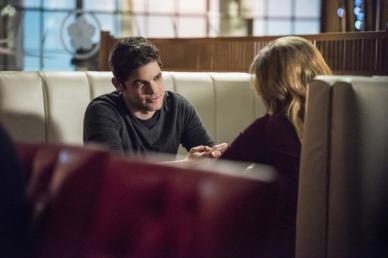 in love. The way he met Lyra feels like a certain set-up for me. Winn is attacked by random alien thugs for no reason and then rescued by a female alien who then shows an interest in him? I feel like those three were working together to get Winn’s attention. Maybe they’re looking for Mon-El (that intergalactic search party/death squad we’ve seen in Supergirl Lives?)? Maybe they want a shot at Supergirl?
in love. The way he met Lyra feels like a certain set-up for me. Winn is attacked by random alien thugs for no reason and then rescued by a female alien who then shows an interest in him? I feel like those three were working together to get Winn’s attention. Maybe they’re looking for Mon-El (that intergalactic search party/death squad we’ve seen in Supergirl Lives?)? Maybe they want a shot at Supergirl?

 a completely random ‘I’m trying to find myself as Supergirl’-explanation before turning around and… well, encountering a new love interest: Mon-El of Daxam.
a completely random ‘I’m trying to find myself as Supergirl’-explanation before turning around and… well, encountering a new love interest: Mon-El of Daxam.
 need her immediate assistance: first call-home-but-not-communicate phase, then being-daxam-enemy-of-kryptonians-everywhere, then interested-in-Kara-but-basically-an-ass, then now-wanting-to-be-a-hero-to-get-into-Kara’s-pants, then still-being-an-ass-but-now-they’re-selling-it-as-being-cute-or-something (I haven’t figured this one out yet, probably because it’s the shittiest piece of crap I’ve encountered on any show for awhile).
need her immediate assistance: first call-home-but-not-communicate phase, then being-daxam-enemy-of-kryptonians-everywhere, then interested-in-Kara-but-basically-an-ass, then now-wanting-to-be-a-hero-to-get-into-Kara’s-pants, then still-being-an-ass-but-now-they’re-selling-it-as-being-cute-or-something (I haven’t figured this one out yet, probably because it’s the shittiest piece of crap I’ve encountered on any show for awhile).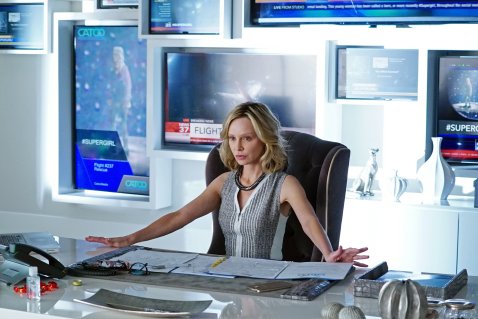 female-empowering, female-supporting show. And yet here we have a character who’s trying to possess the female lead, gets jealous and pouty until she attends to his needs. His half-hearted attempts at adapting to Earthly cultures and habits have taken up at least half of the season while aliens who’re just as foreign as he is, without the benefit of being able to pass (on sight) as Earthling, seem to be adapting quite well.
female-empowering, female-supporting show. And yet here we have a character who’s trying to possess the female lead, gets jealous and pouty until she attends to his needs. His half-hearted attempts at adapting to Earthly cultures and habits have taken up at least half of the season while aliens who’re just as foreign as he is, without the benefit of being able to pass (on sight) as Earthling, seem to be adapting quite well.

 This is to say, of course, if Root’s (Amy Acker) death actually takes – I’m a Xenite, I know how these things sometimes go.
This is to say, of course, if Root’s (Amy Acker) death actually takes – I’m a Xenite, I know how these things sometimes go. A strong, morally incorruptable female character. Joss Carter (Taraji P. Hanson) was that character. She was everything those boys (meanwhile there were three, even though Fusco [Kevin Chapman] wasn’t a main player yet) needed to keep them on track, to help, to criticize. She was a good guy where Finch and Reese’s organisation was a little shady.
A strong, morally incorruptable female character. Joss Carter (Taraji P. Hanson) was that character. She was everything those boys (meanwhile there were three, even though Fusco [Kevin Chapman] wasn’t a main player yet) needed to keep them on track, to help, to criticize. She was a good guy where Finch and Reese’s organisation was a little shady. With Carter’s death, both Shaw and Root’s roles became bigger, their characters more important, more defined. Their relationship became one aspect of their characterization and it was an interesting and popular decision. They were canon – for about 5 seconds. Then Sameen was captured by the bad guys (and Sarah Shahi had her twins). Too little, too late? She could have been the queer character who died and started ‘We deserve better’ but she wasn’t. Because she didn’t die and the makers of POI made that clear by showing she was still alive – and held captive by Samaritan.
With Carter’s death, both Shaw and Root’s roles became bigger, their characters more important, more defined. Their relationship became one aspect of their characterization and it was an interesting and popular decision. They were canon – for about 5 seconds. Then Sameen was captured by the bad guys (and Sarah Shahi had her twins). Too little, too late? She could have been the queer character who died and started ‘We deserve better’ but she wasn’t. Because she didn’t die and the makers of POI made that clear by showing she was still alive – and held captive by Samaritan.